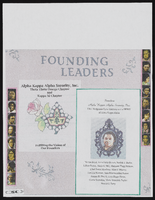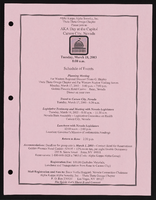Search the Special Collections and Archives Portal
Search Results

Alpha Kappa Alpha Sorority, Theta Theta Omega Chapter: overview of history
Date
Archival Collection
Description
From the Alpha Kappa Alpha Sorority, Incorporated, Theta Theta Omega Chapter Records (MS-01014) -- Chapter records file.
Text

Alpha Kappa Alpha Sorority, Theta Theta Omega Chapter "AKA Day at the Capitol" schedule and supplementary resources
Date
Archival Collection
Description
From the Alpha Kappa Alpha Sorority, Incorporated, Theta Theta Omega Chapter Records (MS-01014) -- Chapter records file.
Text

Sook-ja Kim, February 12, 1996 and April 6, 1996: transcript
Date
Archival Collection
Description
The Kim Sisters, composed of three sisters, Sook-ja, Ai-ja, and Mia, came from Korea to Las Vegas in February 1959. Their first contract in America was to perform at the Thunderbird Hotel for four weeks as part of the China Doll Revue, the main showroom program. This engagement led to a successful career. Their popularity reached was at its height at the end of the 1960s when they performed throughout the United States and Europe. Sook-ja Kim is the oldest of the sisters. After his sister Ai-ja died in 1987, Sook-ja teamed up with her two brothers and continued to perform until 1989. Now semi-retired from show business, with occasional performances in Korea, she is working as a real estate agent. In this interview, she talked about her childhood, her career, and the family she has built since coming to America. Sook-ja was born in 1941 in Seoul, Korea as the third child of seven in a musical family. Her father was a conductor and her mother, a popular singer. After the Korean War, her mother arranged to send the Kim Sisters to America. When they came to Las Vegas, there were virtually no Koreans in the area. They depended on each other to take care of themselves. Some of the difficulties they had to adjust to in American were language, food, and cultural differences. Over the span of almost forty years in America, Sook-ja became acculturated without discarding her ethnic identity of family priorities. Her life-long guiding principle has been to adopt certain American values while continuing to keep her cherished Korean ethnic values. Through their performances, the Kim Sister informed the audience about Koreans and their culture. As the oldest of the group, Sook-ja was entrusted the care of her sisters, and later her brothers, the Kim brothers. Once she settled in Las Vegas, she brought more than forty members of her extended family to the city, contributing to the growth of the Las Vegas Korean community.
Text
Strutt Hurley Collection on the Southern Nevada Association of Pride, Inc. (SNAPI) and Las Vegas Gay Pride
Identifier
Abstract
The Strutt Hurley Collection on the Southern Nevada Pride Association, Inc. (SNAPI) and Las Vegas Pride (1989-2000) contains materials collected and produced by Strutt Hurley during her tenure as Director of Entertainment of SNAPI. Materials include meeting minutes, advertising contracts, Las Vegas Pride programs, and ephemera collected from Pride celebrations in Las Vegas, Nevada and other parts of the United States and the world.
Archival Collection
Wilson Family Papers
Identifier
Abstract
The Wilson Family Papers (1875-1918) document the personal and professional lives of James B. Wilson Sr., James B. Wilson Jr., and George Twison "Tweed" Wilson, early pioneers in Southern Nevada. The collection is comprised of personal correspondence, invoices and advertisements from the Wilson family business, the Sandstone Ranch, and photographs of the extended Wilson family.
Archival Collection
Ray Cutright Collection of Winthrop A. Davis Photographs
Identifier
Abstract
The Ray Cutright Collection of Winthrop A. Davis Photographs (approximately 1929-1939) consists of black-and-white photographic prints with some corresponding negatives and slides of the construction of Hoover Dam and the geographic terrain of southern Nevada during the early 1930s. Included are photographs of the geographic area around the dam site, Black Canyon, and Boulder City, Nevada. Photographs depict the construction of facilities and roads needed for the project.
Archival Collection
Alpha Kappa Alpha Sorority, Incorporated, Theta Theta Omega Chapter Records
Identifier
Abstract
The Alpha Kappa Alpha Sorority, Incorporated, Theta Theta Omega (AKA TTO) Chapter records (1965-2020) are comprised of organizational records, conference programs, digitized copies of the chapter's scrapbooks, and copies of
Archival Collection
C. D. Baker Engineering Field Notebooks
Identifier
Abstract
The C. D. Baker Engineering Field Notebooks are comprised of the notebooks and informational texts Charles Duncan "C. D." Baker created and used between 1909 and 1966 while he served as the County Surveyor for Clark County, Nevada and the City Engineer for Las Vegas, Nevada. The field notebooks contain survey coordinates and elevation data for much of early Las Vegas and provide important information on early property boundaries, historical elevations, and lengths of streets from the 1920s to the 1960s. There are also oversized right of way maps for Clark County, Nevada.
Archival Collection
UNLV Libraries Collection of Gold Strike Resorts Inc. Promotional and Press Materials
Identifier
Abstract
The UNLV Libraries Collection of Gold Strike Resorts Inc. Promotional and Press Materials includes promotional materials, company newsletters, and newspaper clippings for Gold Strike Resorts Inc. located in Jean, Nevada dating from 1986 to 2005.
Archival Collection
Christie Young Papers
Identifier
Abstract
The Christie Young Papers are comprised of Young's personal papers, journals, and photographs between 1982 and 2011. The journals document Young's arrival to Las Vegas, Nevada and her involvement in several nascent Las Vegas lesbian, gay, bisexual, transgender, and queer (LGBTQ) organizations from 1982 to 1985, such as UNLV's Lesbian and Gay Academic Union (LGAU). The collection includes materials related to her life in San Diego, California from 1985 to 1995 and typed transcripts of all journal entries that relate to the Las Vegas LGBTQ community. The collection also includes photographic slides and prints documenting Young's involvement with LGAU and events in the Las Vegas LGBTQ community.
Archival Collection
